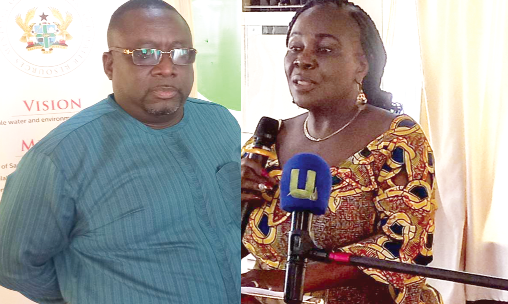
Greater Kumasi households to benefit from sanitation project
The Coordinator of the Greater Kumasi Metropolitan Area (GKMA) Sanitation and Water Project, Mr George Asiedu, has stated that a minimum of 30,000 households within the project area are to be assisted to construct affordable toilet facilities by 2024.
Disclosing this last Monday during a media sensitisation workshop on the GKMA project, Mr Asiedu said after the successful implantation of the Greater Accra Metropolitan Area (GAMA) Sanitation and Water Project, the government decided to extend it to GKMA to solve some of the challenges facing the residents and
also achieve Sustainable Development Goal Six, which was to ensure access to water and sanitation for all by the year 2030.
The workshop followed a baseline survey conducted by the GKMA Sanitation and Water Project, which revealed that 51 per cent of compound houses within Kumasi had no access to toilet facilities.
The survey, which sampled 7,142 households, also revealed that six per cent of the households did not have functioning toilets while 49 per cent did not have any toilet facility.
Out of the households sampled, 70 per cent were compound houses, 15 per cent were private, 11 per cent were apartments, four per cent were uncompleted houses, while one per cent was improvised homes.
Mr Asiedu said from the data obtained, it could be concluded that eight out of 10 compound houses in Kumasi did not have access to toilet facilities and had to rely mostly on public toilets.
The project, which is being funded with $50 million World Bank facility, is being implemented by the Ministry of Sanitation and Water Resources and is for a four-year period.
Subsidy
He said through the project, the government would subsidise the construction of toilet facilities for households within the low income areas in eight districts within the GKMA and also improve access to water supply to 5,000 households.
He added that as part of the sanitation project, households would pay a minimum of GH¢700 to a maximum of GH¢1, 200 for the construction of a toilet facility, depending on one’s choice.
According to him, the cost to be borne by the households under the project constituted 30 per cent of the total cost of the project, while the government would bear the 70 per cent.
Mr Asiedu said the objective of the project was to support and increase access to household toilets.
“Fact is we are aware that a lot more people within the city do not have access to toilets, but that the ministry is making an effort through other projects and intervention support, there is more to be done,” he said.
Institutional support
He said under the project, 120 institutions made up of schools and healthcare facilities would be supported to also build their own toilet facilities.
He said out of the 220 schools surveyed for the project, 57 per cent of them did not have toilet facilities.
He, therefore, appealed to the residents within the selected districts that would benefit from the project to contact their various district assemblies to register and take advantage of the project to own a decent toilet facility.
For his part, the Coordinator in charge of Water, Mr Somuah Tenkorang, explained that all the protocols involved in acquiring new service connections and fees had been simplified and cost reduced to enable households without access to water to take advantage of the project.
For instance, he said from now till the end of December 2024, customers within the project areas would only need to pay an application fee of GH¢200 for a new service connection irrespective of their locations.
He said the paperwork involved in acquiring a new service had also been simplified just to make it easier for households within the low income areas to have access to clean potable water.
He said the target was to connect at least 5,000 new customers by the end of the project. However, he said the Ghana Water Company Limited (GWCL) intended to reach 10,000 households by the end of 2024 under the project.
Interest
In her remarks, the Minister of Sanitation and Water Resources, Ms Cecilia Abena Dapaah, said the media sensitisation was to help the ministry whip up interest and the enthusiasm “in the need to have toilets in our homes, in our towns, communities, in schools, hospitals, markets and businesses”.
She said just like the GAMA project, GKMA was also to deal with sanitation challenges facing the districts.
She said the government through the ministry would continue to find pragmatic solutions to the water and sanitation challenges facing the country.
According to her, “improved sanitation has also been the cornerstone for the development of all countries and the New Patriotic Party (NPP) government strongly believes that providing access to improved toilets for Ghanaians, improves health, and health eradicates opportunistic diseases such as cholera and dysentery.”
Ms Dapaah explained that achieving SDG 6 would not only ensure good health but would promote the dignity of the citizenry and also promote tourism and other socioeconomic activities in the country. #GraphicCleanGH
